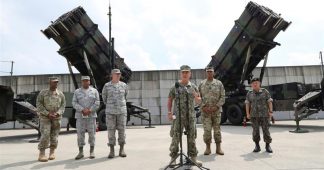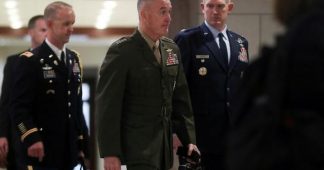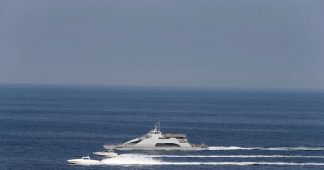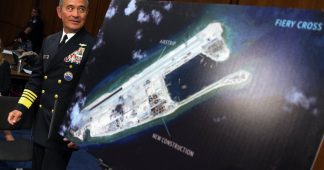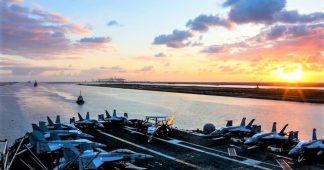Mark Esper sets out to persuade U.S. allies in Asia that the United States has their back.
By Lara SeligmanSYDNEY—Newly confirmed U.S. Secretary of Defense Mark Esper kicked off his first international trip over the weekend with a weeklong Pacific tour, his first test amid growing concern about China’s military buildup and a series of provocative missile launches from North Korea.
The choice of Asia for his first international trip since he was confirmed was a deliberate one, designed to signal that Asia remains the department’s top priority. But after seven months without a confirmed leader at the Pentagon, and with the Trump administration’s erratic foreign policy sowing confusion among friends and foes alike, Pacific allies are watching warily.
On his first stop, Esper and Secretary of State Mike Pompeo received a warm welcome in Australia after landing on Aug. 3. But after a day of closed-door discussions, the two U.S. leaders walked away without a key commitment: Canberra still has not agreed to participate in a U.S. maritime coalition designed to beef up security in the Strait of Hormuz, even as Iran continues to seize tankers in the Persian Gulf.
“The request that the U.S. has made is a very serious one and complex one,” Australian Defense Minister Linda Reynolds said. “We are currently giving this request serious consideration, but no decision has yet been made.” Australia had frigates based in the Gulf until a few years ago, when it shifted resources away from the Middle East to increase its presence in the Pacific.
The U.K. on Monday announced that it would spearhead an international mission designed to ensure safe passage in the Gulf. Working alongside the United States, the Royal Navy will accompany merchant vessels through the Strait of Hormuz, according to the British Embassy. The effort will largely draw on assets already in the region, including the HMS Duncan and HMS Montrose that are already accompanying U.K.-flagged ships.
It was not immediately clear if this international mission is the same as Operation Sentinel or a parallel effort.
Despite a tepid response from Europe and Asia to the U.S. proposal so far, Esper remains optimistic.
“We will have announcements coming out in the coming days where you will see countries begin to sign off,” Esper told reporters en route to Sydney. “That’s good news; our ambition has always been to internationalize it.”
Esper will likely pitch the maritime effort to his counterparts in the other Pacific countries on the tour, including New Zealand, Japan, and South Korea, which get much of their oil from the Gulf. Japan may be the most likely ally to contribute, as it still has naval and air assets, such as P-3 and P-1 maritime patrol aircraft, based in the Middle East. Esper will also visit Mongolia during the weeklong tour.
But Esper’s trip comes amid widespread concern that tensions with Iran, kindled by the intensification of U.S. President Donald Trump’s maximum pressure campaign, will siphon needed resources from the Pacific. The United States has already dispatched to the Middle East an aircraft carrier strike group, a missile defense battery, three squadrons of aircraft, and thousands of troops.
Esper wants to make clear that, despite the short-term attention on the Middle East, China remains his top focus.
“Our strategic competitors are China and Russia, principally, in that order,” Esper said. “I want to go out to the theater to visit with some of our longest-standing allies and [to] make sure they understand that [they have] not just the department’s but my personal commitment, the United States’ commitment to this region.”
Convincing those long-standing allies might be a taller order. Esper’s visit comes as Japan and South Korea are increasingly trying to navigate their own course, given the Trump administration’s erratic policies in the region. Trump dismissed a recent short-range North Korean missile test, even though the missiles pose a direct threat to Tokyo and Seoul. He has suggested abrogating the U.S. defense agreement with Japan and has repeatedly badgered South Korea to pay more to support U.S. troops deployed there.
The most recent North Korean missile test could be a particular source of friction. Trump downplayed the launches, calling them “very standard.” U.S. allies in Seoul and Tokyo likely see the short-range missiles as anything but.
Esper declined to address the launches directly, instead insisting that the president’s diplomatic efforts with North Korea “have stabilized the situation, far differently from what it was” when he first took office.
Another source of concern: the U.S. exit last week from the Intermediate-Range Nuclear Forces (INF) Treaty with Russia, which since 1987 has limited the deployment of midrange missiles. U.S. and NATO officials say that Russia has long violated the INF Treaty. And China, which is not a party to the agreement, has deployed hundreds of midrange conventional missiles across Asia, a growing concern for U.S. officials and allies in the region. By staying in the treaty, U.S. officials say, they were hamstrung in responding to China’s missile deployment.
Now, Esper is eager to deploy previously banned land-based missiles to the Pacific within “months.” Starting this month, the department is planning tests of two types of missiles that were banned under the INF Treaty: a low-flying cruise missile with a potential range of about 620 miles and a ballistic missile with a range of about 1,800 to 2,500 miles. Neither would be nuclear-armed, officials stressed.
“We’d like to deploy a capability sooner rather than later … because of the great distances we need to cover [in the Pacific] and how important an intermediate range conventional weapon would be to the Asia, Indo-PACOM theater,” Esper said, speaking with traveling press en route to Sydney.
But it is not yet clear whether America’s Pacific allies will agree to host the new missiles. Japan has proposed replacing the INF Treaty with a multilateral structure limiting these types of weapons that would for the first time include China. Beijing has so far expressed no interest in participating in such a deal. Australia, for its part, seemed to rule out the idea of hosting such missiles.
Deploying such weapons to the Pacific region is likely to anger Beijing, which recently released a new defense white paper accusing the United States of increased aggression. But Esper dismissed such concerns.
“I don’t see an arms race happening,” he said. “I do see us taking proactive measures to develop a capability that we need for both the European theater and certainly this theater.”
Published at https://foreignpolicy.com/2019/08/05/pacific-tour-tests-new-pentagon-chief-mark-esper-first-international-trip-asia/

